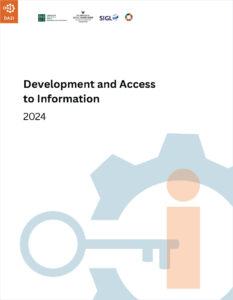2024 Development and Access to Information (DA2I) Report launched
15 May 2024
The Hague, Seattle, 15 May 2024—
Increased internet connectivity will not lead to development without equity, rights, skills, and the libraries that provide them
The International Federation of Library Associations and Institutions, the Technology and Social Change Group at the University of Washington and Stichting IFLA Global Libraries today release the 2024 Development and Access to Information (DA2I) Report.
 Building on the two previous editions, the 2024 DA2I report looks back on progress in delivering on universal, meaningful access to information for development over the first half of the delivery period for the United Nations’ 2030 Agenda, through data and expert insights.
Building on the two previous editions, the 2024 DA2I report looks back on progress in delivering on universal, meaningful access to information for development over the first half of the delivery period for the United Nations’ 2030 Agenda, through data and expert insights.
The DA2I initiative is based on the conviction that access to information is an essential precondition for development. Without it, decision-making is poorer, democracy is weaker, and progress is slower towards the Sustainable Development Goals. Universal, meaningful access can only happen when there is universal connectivity, equity in societies, and the rights and skills to produce and use information.
The key headline from the 2024 DA2I report is that progress on connectivity is not being matched by advances elsewhere. In particular, measures of equity – notable between women and men – have stagnated, while the key political and civil rights are in decline. This risks reducing or even cancelling out the positive development impact of more people coming online.
While some countries go against the trend, the overall message is that it is as important as ever to promote a comprehensive and holistic approach to access to information. A crucial element of this is to promote strong and inclusive library networks, able to provide the right mix of connectivity, content, competences and confidence to turn internet access into meaningful access to information, for all.
This is a key relevant point for the upcoming UN Summit of the Future, where leaders will discuss how to ensure the impact of the UN’s work in the coming years. The DA2I Report underlines that a strong focus on information and knowledge, how it is managed, and how it is made accessible and usable must be part of this.
The report includes a summary of data from the DA2I Dashboards led by the Technology and Social Change Group at the University of Washington, as well as expert chapters from Ambassador David Donoghue, Professor Lawrence Surendra, Dr Ariel Vercelli, Dr Albert Byamugisha, David Banisar, and Melissa Hagemann.
“Libraries, and the information and knowledge to which they give access, can be transformative. As a librarian, my job is to ensure that this potential is realised every day, with all users given not just the access, but also the skills, setting and support needed to make a difference. The DA2I report underlines the same at a global level. It makes clear that we need to go beyond access alone, and ensure that laws, conditions and infrastructures are in place to make sure that we can achieve development everywhere, at every level. This of course includes libraries, working together to provide the most inclusive and impactful access to information possible”, Vicki McDonald, IFLA President 2023-2025.
“With success in the Sustainable Development Goals still a long way off, we need libraries as motors of change. They are critical community information infrastructures, helping to turn access to information into progress towards development goals. The DA2I report underlines the importance of this more holistic, comprehensive approach to information access, urging a greater focus on equity, rights and skills. Stichting IFLA Global Libraries (SIGL) is happy to make this work possible, providing libraries and information advocates everywhere with a key new tool for them in their work”, Glòria Pérez-Salmerón, President, SIGL.
“The analysis of global progress toward meaningful access to information underscores the enduring significance of libraries as critical social infrastructure, their relevance more pertinent than ever. Despite aspirations, expanded internet access has not facilitated increased freedom or equitable societies. The report’s findings illuminate this sobering reality, prompting policymakers and stakeholders to reassess strategies for fostering equitable access to information. Positioned as trusted hubs for knowledge dissemination, libraries are poised to bridge the digital divide and champion inclusivity in our increasingly interconnected world”, Maria Garrido, Principal Research Scientist, Technology and Social Change Group, University of Washington
IFLA’s work on the DA2I project is made possible by a 2023 grant from Stichting IFLA Global Libraries (SIGL).
Download
Development and Access to Information 2024
Building on the two previous editions, the 2024 DA2I report looks back on progress in delivering on universal, meaningful access to information for development over the first half of the delivery period for the United Nations’ 2030 Agenda, through data and expert insights. The DA2I initiative is b...
For further information, please contact:
TASCHA: Maria Garrido, migarrid@uw.edu
IFLA: Stephen Wyber: Stephen.wyber@ifla.org